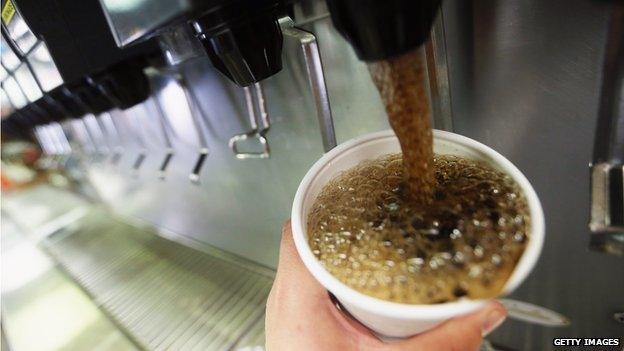Is New York's supersize soda ban a civil rights issue?
- Published

New York City's ban on large-size sodas and other sugary drinks is being challenged by African American and Hispanic groups. How did cola become a civil rights issue?
When Martin Luther King told crowds of idealistic demonstrators he had a dream, it's unlikely that the right to sell soft beverages greater than 16oz (0.5 litre) was part of his vision.
But his heirs in the US minority civil rights movement have taken up opposition to a ban on supersize sodas as their latest crusade.
New York City Mayor Michael Bloomberg has called for the ban as a way to reduce obesity and its related health problems.
But it is being challenged in court by a coalition of bodies including the New York State wing of the National Association for the Advancement of Colored People (NAACP), best known for its battles against segregation and discrimination.
Also supporting the action is the Hispanic Federation, a network of 100 Latino organisations.
Both groups say the ban will disproportionately affect soda sales in bodegas, or independent convenience stores, which tend to be owned and run by minorities.
Supermarkets and many convenience store chains such as 7-Eleven - home of a supersize beverage known as the Big Gulp - are not subject to city health regulations.
Hazel N Dukes, president of the NAACP New York State Conference, said the movement's stand was about "basic economic fairness".
"As the new rules stand, small mom and pop stores in the city, which are disproportionately owned and operated by people of colour, must comply with the law and suffer the financial consequences," she said.
"Meanwhile, national chains like 7-Eleven, which can handle the financial loss, are exempt. You can't be serious about banning big sodas when you have a loophole for Big Gulps."
The ban, which was passed in September 2012, will apply to sugary beverages larger than 16oz (0.5 litre).
Diet sodas, alcoholic beverages and drinks that are more than 70% juice will not be affected.
Restaurants and others that violate the law face a $200 (£124) fine.
It appears the ban will disproportionately affect minority consumers, too.
A suggested that seven in 10 black New Yorkers and about 60% of Hispanics said they usually drank regular non-diet sodas. By contrast, fewer than 40% of whites said the same.
But because of this, supporters of the ban say the NAACP and Hispanic Federation are letting down the communities they are supposed to represent.
According to the Centers for Disease Control and Prevention, non-Hispanic blacks have the highest rates of obesity in the US at 44.1%. Mexican Americans have the second-highest with 39.3%.
City officials say New York's obesity rate is rising, having reached 24% of adults, up from 18% in 2002.
Obesity-related illnesses in New York cost more than $4.7bn (£3bn) a year to treat, with government programmes picking up about 60% of the cost, according to city Health Commissioner Thomas Farley.
Dukes said she supported tackling obesity by limiting unhealthy food and increasing opportunities for physical activity, but insisted it was wrong to "single out" bodegas which struggle to compete with large corporations.
"No one doubts that obesity, diabetes, and heart disease exert a disproportionate toll on African-Americans, Latinos, and low-income Americans generally," says Michael F Jacobson, executive director of the Center for Science in the Public Interest.
"Any group seeking to end health disparities should make reducing soda consumption a top priority."
the NAACP and Hispanic Federation for accepting funding from the soft drinks industry.
New York resident: "I feel it should be up to the individual and not the mayor to dictate something like this"
Jacobson said the NAACP would "regret" its association with "Big Soda" and urged it to rethink its position.
An NAACP health education programme, Project HELP, has received funding worth thousands of dollars from Coca Cola and Hispanic Federation ex-president Lillian Rodriguez Lopez now works for the company.
Dukes has rejected the idea that donations have made any impact, telling the Associated Press: "No one buys the NAACP."
Hispanic Federation President Jose Calderon did not respond to the ┤¾¤¾┤½├¢'s request for a statement.
The minority advocates opposing the ban appear to have public opinion on their side, however. The New York Times poll suggested that 60% of New Yorkers were against the measure.
But the authorities say they are determined to press ahead. During Bloomberg's 11-year time in charge of New York, chain restaurants have been compelled to post calorie counts on their menus and barred artificial trans fats in French fries and other restaurant food.
Now they must wait for the great soda battle to be decided in the courts.
You can follow the Magazine on and on